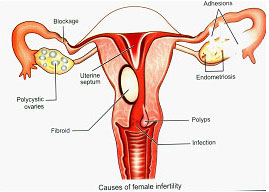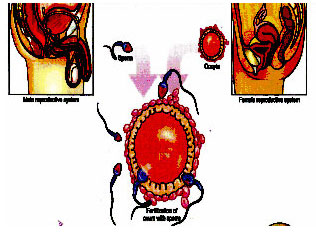Infertility/IVF Clinic
One of life's greatest gifts is to be able to conceive a child. Infertility can be a frustrating and frightening experience to some. It can be an emotional, psychological and physical crisis. Understanding the medical aspects as well as personal issues and becoming knowledgeable about infertility can help people cope better with many options that are there.
Infertility by definition is the failure of couples to conceive in one year of trying with regular unprotected intercourse. Infertility affects 15% to 20% of all couples who are trying to conceive. The causes are many and may be associated with low sperm count, anatomic defects or disease and fallopian tube scaring are the most common factors that may cause infertility.
Causes of infertility
Female
- Ovulatory failure or dysfunction interference or interruption at any number of points in the normal ovarian cycle could affect ovulation. The causes could be deficiency or asynchronised secretion of the controlling hormones. The ovaries may be resistant to the hormones or may be disease or damaged. Problems in ovulation lead to lack 0f menstruation (amenorrhea) or infrequent menstruation (oligomenorrhea). Lack of ovulation causes anovulatory infertility infertility in two groups:
- - Group I : Hypothalamic pituitary failure
- - Group II : hypothalamic pituitary dysfunction.
- Tubal Failure the tubes may become blocked as a result of scarring due to pelvic infection, appendicitis, peritonitis or previous abdominal surgery or due to fibroids.
- Endometriosis- This is a condition in which the endometrium proliferates and spreads outside the uterus. The fertility is affective depending on the severity of the condition.
- Advanced Age the fertility potential is maximum around 24 years of age. The fertility potential begins to decline by age 30 and accelerates by age 35. With advancing age there is a decline in ovaries reserve and the quality of oocytes. It is also thought that diminished endometrial receptivity with advancing age may play a role.
- Luteal phase defect (LPD) LPD occurs when the corpus luteum secretes an inadequate amount of progesterone. There are many causes for LPD but the end result is that the endometrium is not adequately prepared for implantation and nourishment of the fertilised embryo leading to infertility.
- Cervical factors cervical causes may be related to poor quality or quantity of cervical mucus, cervical stenosis and varicosities of the endocervical polyps and cervical fibroids can obstruct the os.
- Others/unexplained causes other causes are obesity, hormonal imbalances like hyperprolactinemia, hypothyroidism, immunological causes like presence of antisperm antibodies, vaginal infection and some unknown causes.
Male
- Semen containing no sperm ( azoospermia), or few sperm (oligospermia), poor quality sperm (asthenospermis) or a high percentage of abnormal sperm (teretospermia) or combination of these condition of these conditions.
- Anatomic factors like varicocele, cryptorchidism and congenital anomalies like hypospadias.
- Endocrine factors like cushings disease, Acromegaly and pituitary tumor.
- Infection like gonorrhea/Chlamydia, prostatitis and epididymitis.
- Ejaculatory dysfunction like retrograde ejaculation, ejaculatory failure and neurologic impairment.
- Immunologic factors like presence of antisperm antibodies.
- Psychological dysfunction.
- Unexplained causes.
Diagnosis of infertility
Female
- A thorough and detailed history is essential for an accurate diagnosis.the assessment should include age, body mass index, occupation, menstrual cycle pattern, use of contraceptives, previous infections, coital frequency, history of infertility in t
- He family, surgeries undergone and previous infertility treatment.
- A physical examination for thyroid abnormalities and pelvic examination for the condition of the external genitalia and reproductive organs.
- The ovulation status assessed by the BBT chart, evaluation of the cervical mucus for sperm migration, midluteal serum progesterone (Day 21) measurement, endometrial biopsy or ultrasound.
- Serum hormone evaluation of FSH, LH prolactin and thyroid hormones.
- Tubal patency assessed by sonosalpingography /hysterosalpingography or laparoscopic chromoperturbation test.
- Uterine assessment by hysteroscopy.
MALE
- Semen analysis & sperm function test.
- Visual assessment for volume, appearance, liquefaction and consisitency.
- Microscopic assessment of count, motility and morphology .
- PH.
- Test for presence of antisperm antibodies by immunobead or mixed agglutination reaction.
- Endocrine assessment if clinically indicated.
- Postcoital test for sperm penetration ability.
Our Team
We have a talented team of doctors with rich experience and success in treating infertility cases. We serve all infertility requirements under on roof. Our clinic and doctors provide you with the most up to date procedures with latest equipment. Treatment is based on the latest medical techniques and all procedures meet every advancement in the field of infertility. We are committed to treat each client who comes to our clinic to the specification of their individual concerns and needs. Finding a solution may be the decision to have or continue treatment for infertility, consider, IVF, ICSI, surrogacy or adopt a child.








